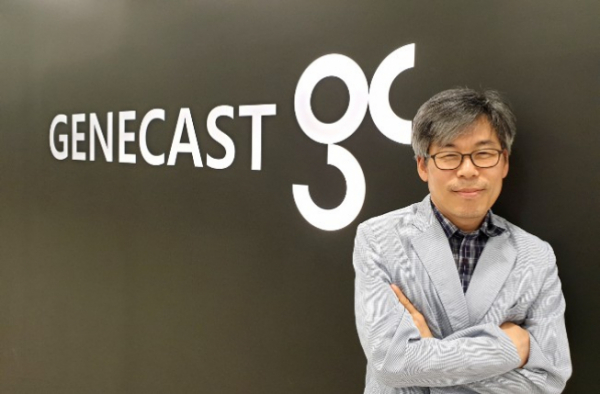기업
Genecast Challenges Liquid Biopsy with New Polymerase
by Jongwon Jang
Developed as ADPS platform with the maximum sensitivity of '0.0001%': EGFR mutation diagnostic kit is expected to enter the US PMA clinical trial

▲Lee Byung-Chul CTO
Since its founding in 2016, Genecast has aimed to enter the global liquid biopsy market, including the U.S. The company intends to compete in the global market by demonstrating technical excellence and marketability of the allele-discriminating priming system (ADPS), a self-developed selective gene amplification system, through a pre-market approval (PMA) clinical trial required by the U.S. Food and Drug Administration(FDA).
Genecast CEO Baek Seung-Chan said, “We have secured a source technology and solution to monitor cancers with a sensitivity of and the solution to monitor the cancer with a sensitivity of 1/1,000,000 and have our technology verified through a global clinical trial in the liquid biopsy market, which is expected to change the future of humanity for the next three decades.”
Genecast has secured ultra-sensitive detection technology by innovating the polymerase chain reaction (PCR).
CTO Lee Byung-Chul developed a new DNA polymerase directly involved in gene amplification. This new polymerase, named Smart DNAP, is characterized by enhanced differentiation ability to amplify only mutated genes while leaving normal genes intact. By amplifying only the mutation gene, it is possible to achieve super sensitivity. Additionally, Genecast has completed a blood-based cancer diagnostic platform technology called ADPS, combining primer-probe design technology with reaction buffer optimization technology to maximize performance of Smart DNAP.
The ADPS has proven its detection sensitivity through repetitive pilot experiments and simple clinical trials. The company has verified the technology by securing more than 100 samples of blood samples of actual patients from domestic institutions including Korea University Medicine, Asan Hospital, and Yonsei Severance Hospital, and from overseas institutions such as Shanghai Clinical Research Center (SCRC) of China and YZY of China. As a result, the company secured a detection sensitivity of 0.0001%. Additionally, screening time was shortened to two hours and 30 minutes, and screening costs were reduced to 1/10 of the existing level, showing an economic advantage.
The primary goal of Genecast is to obtain approval for the ADPS-based 'EGFR mutation diagnostic kit', which can be used for selection of a non-small-cell lung cancer treatment, through the U.S. FDA’s PMA clinical trial. Last November, the company applied for a clinical trial to the FDA and reached the final stage of consultation to enter a clinical trial. BT Solutions CEO Kim Do Hyun, who worked as an FDA examiner, is assisting Genecast. The company plans to complete the clinical trials and initiate the approval process by the third or fourth quarter of next year.
Genecast recently launched three research products in Korea, including the BRAF Mutation Test Kit, EGFR Mutation Test Kit, and JAK2 Mutation Test Kit. Among them, the BRAF Mutation Test Kit has a detection sensitivity of 0.0001% (3/3,000,000), while the other two research products Have a detection sensitivity of 0.01% in consideration of the reality of clinical situations.
Genecast plans to release six types of research-exclusive cancer gene diagnosis kits including KRAS, NRAS, PIK3CA, pTERT, IDH1 and IDH2 by the end of the year and to complete the CE-IVD approval by 2020.


















